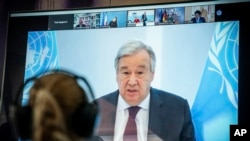The United Nations is calling on governments to focus on mental health services as people all over the world deal with the coronavirus pandemic.
“After decades of neglect and underinvestment in mental health services, the COVID-19 pandemic is now hitting families and communities with additional mental stress,” U.N. Secretary-General Antonio Guterres said Thursday.
He said healthcare workers, the old and young, and those with pre-existing mental health conditions or who are dealing with conflict and crisis are at the most risk.
“The United Nations is strongly committed to creating a world in which everyone, everywhere, has someone to turn to for psychological support,” Guterres said. “I urge governments, civil society, health authorities and others to come together urgently to address the mental health dimension of this pandemic.”
The U.N. chief’s message followed one from the World Health Organization saying the virus that has so far infected more than 4.3 million people and killed about 300,000 may become endemic like HIV, the virus that causes AIDS.
It could stay embedded in communities even if a vaccine is found, said WHO emergencies director Mike Ryan during a virtual press conference from Geneva.
"HIV has not gone away, but we have come to terms with the virus," he said.
About 100 organizations worldwide are working on developing a coronavirus vaccine. Even if they find one that works, containing the virus will take a “massive effort,” Ryan said.
While some countries are relaxing lockdown orders, the pandemic has had a huge economic effect.
A U.N. report expects the world economy to shrink by more than 3% this year, a sharp departure from January when the world body was predicting growth of 2.5% worldwide.
New Zealand reported no new cases again Thursday as it allowed malls, stores and restaurants to reopen. The move is part of the country’s staged reopening after a strict monthlong lockdown, and people still must observe social distancing rules and limits on the size of gatherings.
In the United States, the government’s top virology expert, Dr. Anthony Fauci, warned the public and leaders of the dangers of reopening too soon and risking an outbreak that would be difficult to control.
However, President Donald Trump said Wednesday that people want the country reopened, including businesses and schools.
“We have to open our country. Now, we want to do it safely, but we also want to do it as quickly as possible. We can’t keep going on like this,” Trump said.
The Supreme Court in the state of Wisconsin ruled Wednesday that the governor’s health secretary lacked the power to issue a stay-at-home order that was due to run through May 26. Republicans challenged the order, and after the 4-3 ruling the statewide restrictions on non-essential businesses, travel and group gatherings were lifted.
Governor Tony Evers rejected the ruling, saying it throws the state “into chaos” and that there is “no question among anybody that people are going to get sick.”
The mayor of Washington, D.C, Muriel Bowser, extended the U.S. capital’s stay-at-home order, which was to expire Friday, until June 8. She said she wants to see a steady decline of new cases over two weeks before lifting restrictions. Governors of neighboring states Virginia and Maryland are planning to ease their lockdowns in places where the spread of the virus has halted.
Los Angeles County, California, the most populous U.S. county, with 10 million residents, is expected to announce a three-month extension of its lockdown.






